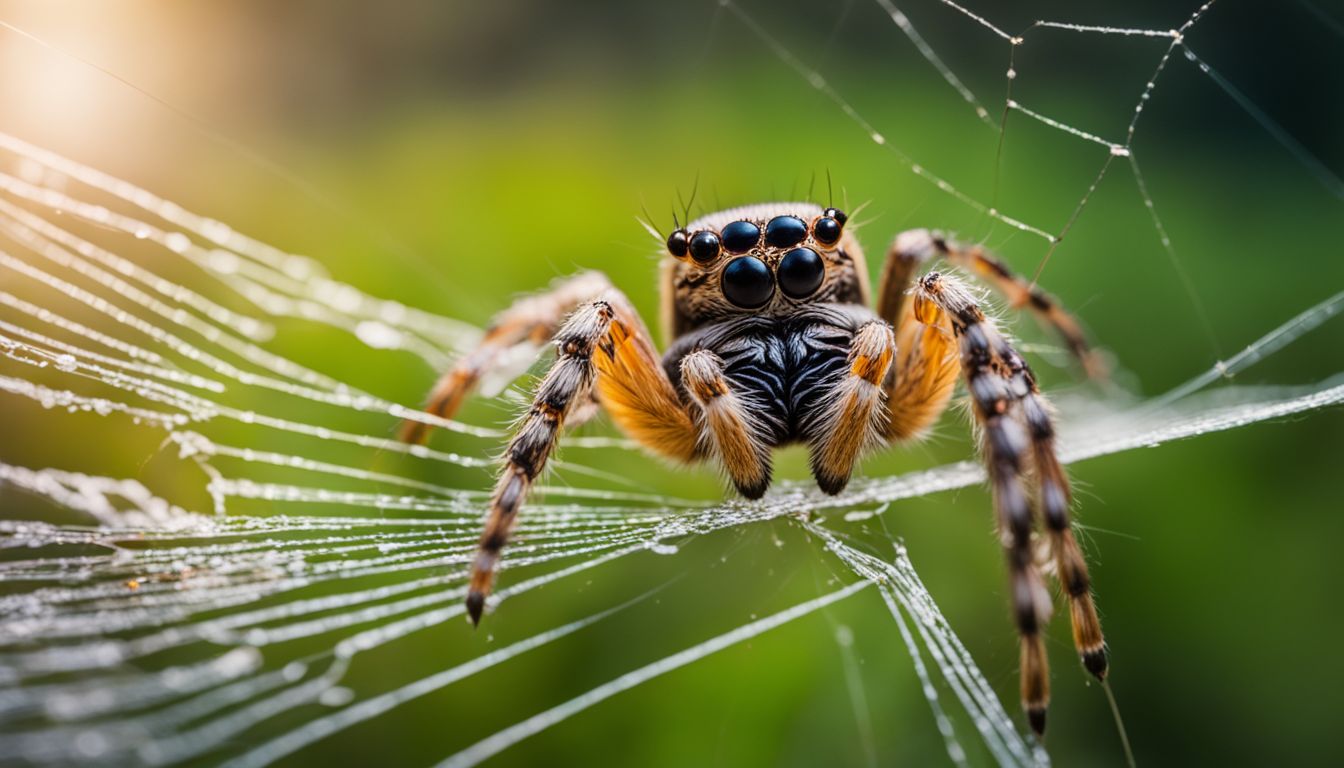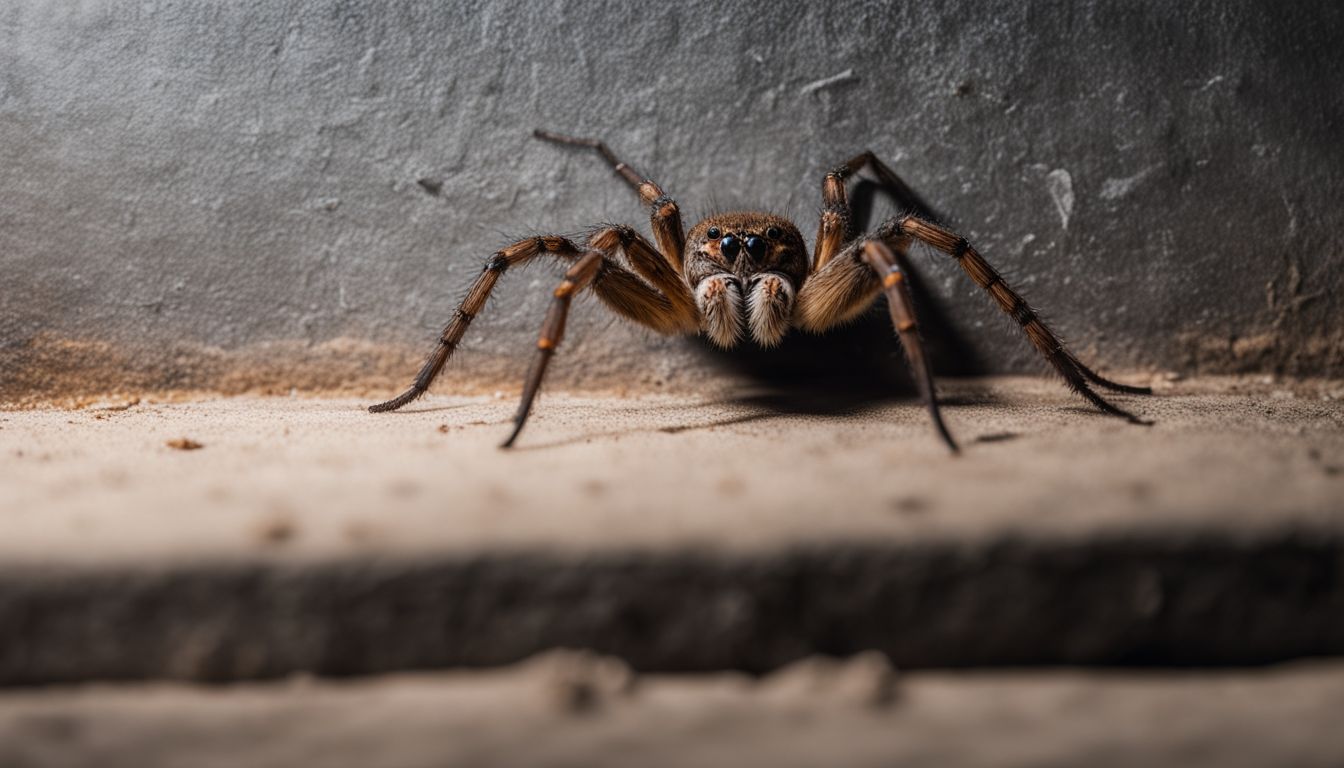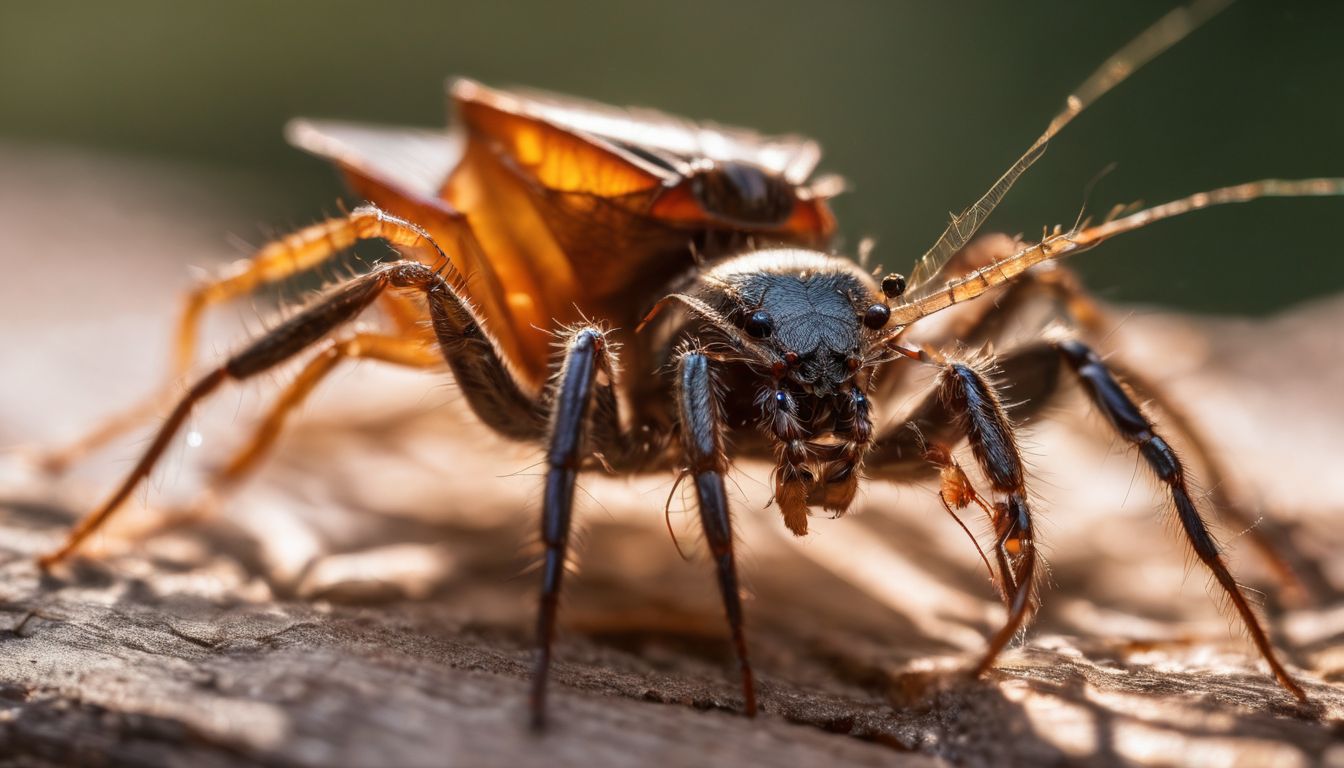Are you tired of seeing roaches scurrying around your home? Spiders could be the natural pest control heroes you’re looking for, with their appetite for insects like cockroaches. This blog will dive into how these eight-legged hunters can help keep your roach worries at bay.
Stay tuned to discover if spiders are the answer to your pest problems!
Key Takeaways
- Spiders, especially wolf spiders, jumping spiders, and Huntsman spiders, are effective natural predators of roaches and contribute to controlling roach populations in homes and gardens.
- The size of the spider matters in predation; larger spiders are better at catching and consuming roaches compared to smaller ones due to their ability to overpower larger prey items.
- While spiders can help manage roach infestations, integrated pest management strategies should be considered for more comprehensive control due to limitations in spider predation effectiveness.
The Role of Spiders in Pest Control

Spiders play a vital role in controlling pest populations, as they are natural predators of insects. Their hunting techniques and ability to sense prey make them effective at keeping insect populations in check.
Natural Predators of Insects
Some animals are really good at catching bugs. Spiders are one of those hunters. They eat many types of insects, like crickets and grasshoppers. Spiders use their venom to stop the bugs from moving so they can eat them.
Wolf spiders are great at this job. They don’t wait for food to come to them; they go out and find it! These spiders can hunt down different insects, even ones that move fast like cockroaches.
Because they have such a big appetite, wolf spiders help keep the number of pests down in gardens and homes.
Spiders’ Hunting Techniques
Spiders have two main ways to catch bugs like roaches. They can sneak up and jump on their prey, or they can make webs that trap them. Spiders use their venom to paralyze or kill the roaches after they catch them.
They are quick hunters and do not wait for food to come to them.
The hunting ways of spiders work well against many pests, including cockroaches. These skills make spiders great at controlling these unwanted guests in our homes. Next, let’s look at which types of spiders are best at hunting down roaches.
Types of Spiders That Prey on Roaches

Wolf Spiders, Jumping Spiders, and Huntsman Spiders are all known to prey on roaches as part of their natural hunting behavior. Each spider utilizes different techniques and strategies to catch and consume their prey.
Wolf Spiders
Wolf spiders are like nature’s pest control agents. They have a special way of hunting that does not need webs. These strong hunters chase down roaches much like wolves do with their prey.
They surprise and grab them with speed.
These spiders love to munch on cockroaches, including the younger ones and the eggs. This helps keep roach numbers down. Carolina wolf spiders are very good at this job and you might find them around your home, in mulch piles or leaf litter where roaches hide.
Jumping Spiders
Now let’s talk about jumping spiders. These tiny but mighty creatures are skilled hunters. They have excellent eyesight and can jump many times their body length, allowing them to ambush and capture small roaches.
Jumping spiders are agile and use their keen vision to stalk and pounce on their prey, making them efficient predators of smaller roach species.
Jumping spiders might be small, but they make up for it with their swift movements and sharp vision. Their ability to leap onto unsuspecting roaches makes them valuable allies in controlling these household pests without the need for harmful chemicals or extermination methods.
Huntsman Spiders
Moving on from jumping spiders, let’s delve into the fascinating world of Huntsman spiders. These arachnids are efficient hunters and are known for their nocturnal activities. Huntsman spiders actively search for prey during the night, making them effective predators of cockroaches, palmetto bugs, and other troublesome household pests.
Their presence in an area often leads to a decrease in roach populations, contributing significantly to pest control without any harmful chemicals or interventions.
With their stealthy hunting skills and preference for nighttime activity, Huntsman spiders play a crucial role in naturally managing roach infestations. Their contribution to controlling these unwanted household pests makes them valuable allies in maintaining a healthy and balanced home environment.
Spiders’ Sensory Abilities in Hunting
Spiders have excellent sensory abilities, including the ability to see in the dark and detect vibrations through their webs. These skills make them highly effective hunters, especially when it comes to preying on roaches.
Can Spiders See in the Dark??
Spiders can’t see in the dark as we do, but they have other ways to find their prey. Some spiders can detect movements using tiny hairs on their legs, which helps them capture insects even in low light.
Additionally, some spiders have exceptional hearing and sense vibrations through the ground, making it easier for them to locate their next meal.
Let’s dive into understanding how spiders’ sensory abilities help them hunt effectively.
The Effectiveness of Spiders in Controlling Roach Infestations
Spiders can be effective in controlling roach infestations, but there are limitations to their ability to completely eliminate the problem. Factors such as size and environmental conditions play a role in the effectiveness of spider predation on roaches.
Limitations in Roach Control
Spiders can help control roach populations, but they may not be the ultimate solution. Using insecticides to fight roaches is becoming less effective and creating stronger resistant strains of roaches.
However, it’s important to note that certain roach species have developed resistance mechanisms to insecticides. This means that while spiders play a role in controlling roach populations, they may not be able to completely eliminate an infestation on their own.
The size factor plays a significant role in predation by spiders, with larger insects being easier targets for them. Additionally, environmental factors can impact spider predation on roaches.
These limitations highlight the need for integrated pest management strategies where various methods are used together to effectively control and eliminate cockroach infestations.
The Size Factor in Predation
When it comes to controlling roach infestations, the size of the spider matters. Research suggests that larger spiders are more effective at catching and consuming roaches. This is because their larger body size allows them to overpower and consume larger prey, like roaches.
So, when it comes to managing roach populations, having bigger spiders around may be beneficial in keeping the infestation in check.
Additionally, studies have shown that smaller spiders may struggle to capture and feed on roaches due to their size limitations. In contrast, bigger spiders have an advantage in preying on these pests due to their ability to tackle larger prey items effectively.
Environmental Impact on Spider Predation
Spiders play a crucial role in maintaining the balance of nature by controlling insect populations. However, their impact on roach predation can be influenced by environmental factors such as temperature, humidity, and availability of prey.
An increase in pesticides or chemical sprays can also affect spider populations and their ability to control roach infestations. Therefore, it’s important to consider the environmental impact on spider predation when looking at natural pest control methods.
The effectiveness of spiders in controlling roach infestations is not fixed but varies according to environmental conditions and the presence of other predators or factors that may limit their ability to hunt effectively.
Conclusion
In conclusion, spiders can be effective in controlling roach infestations. Different spider species have varying abilities to hunt and consume roaches, providing a natural alternative to chemical pest control methods.
However, it’s essential to remember that spiders are not a substitute for professional pest control help when dealing with severe infestations. Researching the eating habits and effectiveness of spiders in controlling roaches can help homeowners make informed decisions about pest management.
To learn more about spiders’ unique night-time hunting abilities, read our piece on whether spiders can see in the dark.
FAQs
1. Can spiders help get rid of roaches?
Yes, some spiders like brown recluse and black widows are hunters and can catch and eat roaches.
2. Are all spiders good at killing roaches?
Not all spiders kill roaches, but many that ambush their prey or build webs can trap them.
3. Should I be scared if I see a spider in my house?
Most spiders do not hurt people. Black widow bites can be bad, but they mostly stay away from humans.
4. Do exterminators use spiders to control bugs like cockroaches?
Exterminators usually don’t use spiders to kill pests because people often fear them, even though they might eat bugs like roaches.
5. Is it safe for my pets when there are venomous spiders around?
Keep an eye out for dangerous spider bites on pets like bites from black widow or brown recluse spiders which could hurt your pet just as dog bites would.
6. What else do I need to know about how effective spiders are against cockroach infestations?
Spiders are opportunistic predators; they might help control pests such as ants, bed bugs, and beetles along with hunting down the occasional American cockroach.




